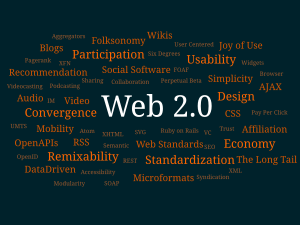
Through my time in education, I have been on many campuses of varying grade levels. Some schools are 1-to-1 and others have one or many computer labs. When I visit classrooms full of computers, I often find kids sitting in rows of desks listening to the teacher lecture. I have heard the question asked, “If we didn’t call it a pen lab, why do we call it a computer lab?” This is such a critical question as we move forward in the field of education and the use of technology. So I start with this…Is technology’s place in education as a tool or an instructional practice?
When I was in school (which was not that long ago), the Internet was still in its infancy compared to where it is today. We used it for some research but books were still the main source. Only wealthier families had computers in their homes. My junior year in high school, I went to my grandmothers house, started the computer with a DOS prompt, and printed on a dot matrix printer. Keep in mind this was only a little more than 10 years ago. Today students have the ability to visit the Internet, complete ALL of their research with constantly updated sources, create a multimedia project over their research topic, and submit their assignment all without touching a piece of paper. I wonder how often this happens.
In Texas, the requirement of a technology class as a graduation requirement has been revoked this year. Many teachers have asked how students are going to learn their technology. Some schools will continue to keep a technology course as a local graduation requirement. My answer is to integrate technology directly in all classroom curriculum. Train teachers in the effective use of technology as an instructional tool. Put technology in the hands of students, rather than just in the hands of teachers.
For this to happen, certain questions must be addressed:
1. How can we afford technology with decreased funding and increased budget cuts?
Use technology that students already have. Use programs such as Poll Everywhere to allow students to provide instant feedback on questions rather than purchasing expensive student response systems (AKA “clickers”). Pair students if not all students have access to a cell phone to ensure equal access. Utilize text messaging for scavenger hunts. Allow students with smart phones to pair with other students and complete research online. Many are concerned about the management of cell phones in the classroom. We must simply train educators on effective classroom management strategies when utilizing technology.
If cell phones aren’t an option, net books and other technologies are drastically dropping in price allowing schools to increase their mobile laptop labs or move to a 1-to-1 initiative.
2. We already have a ton of technology on our campus, but it is not being utilized.
I have a one word response to this question…TRAINING. Technology is not native to most teachers. They need to be trained on proper ways to integrate the various tools on campus. Training must be continuous and backed with support. When I talk to administrators regarding their interactive whiteboards, there are many times I find they are being used as glorified whiteboards. With further prodding, I realize the teachers have only received the one day training provided by the company demonstrating how the product works. Once teachers learn how technology works, they need to be trained on how to use it in their instruction. They need to be showed where they can find lessons, how to effectively use various tools, and examples of effective implementation. When training teachers in technology, they need to be able to use what they learn immediately. As part of the training, require them to create something and use it in their class within the upcoming weeks.
3. My teachers are provided training and support, but they just don’t see the value. How can I change this?
The best way to implement effective practices is through modeling. When there is a staff meeting, utilize the technology in presentations and give small tidbits to teachers regularly. Allow teachers that are effectively using technology to demonstrate lessons or techniques to the staff. Create groups of teachers to roll out various technologies. My philosophy has always been to “bleed” technology. I implement it in a few key areas and support teachers as they come and ask for help. When teachers see the excitement of students attending certain classes, they decide they want to improve their instructional practice and begin using technology also.
Someday I hope to walk in every school and see students effectively using their “classrooms,” not computer labs, to create projects and take charge of their own learning. As we shift technology from just another classroom tool to an instructional practice, classrooms will become more engaging and student-centered. The use of technology will become focused on the learning objectives rather than how to use a piece of equipment. I understand their are a lot of changes that need to be made and many hurdles to jump. However, I know the dialog must begin today for this shift to happen! I challenge administrators reading this post to begin the discussion of how they can implement change on their campus. I challenge teachers not currently using technology to pick one lesson and integrate technology into it, try it with your kids, and see what happens! I challenge teachers already using technology to show off their lessons and share with other teachers so the profession can grow together! Have fun and integrate technology in your instruction today:)
![Reblog this post [with Zemanta]](http://img.zemanta.com/reblog_e.png?x-id=70005ab3-1571-4c12-b7d5-46eb95ebfe95)

![Reblog this post [with Zemanta]](http://img.zemanta.com/reblog_e.png?x-id=5245bfdb-1e67-4dc0-b516-6066063927b2)